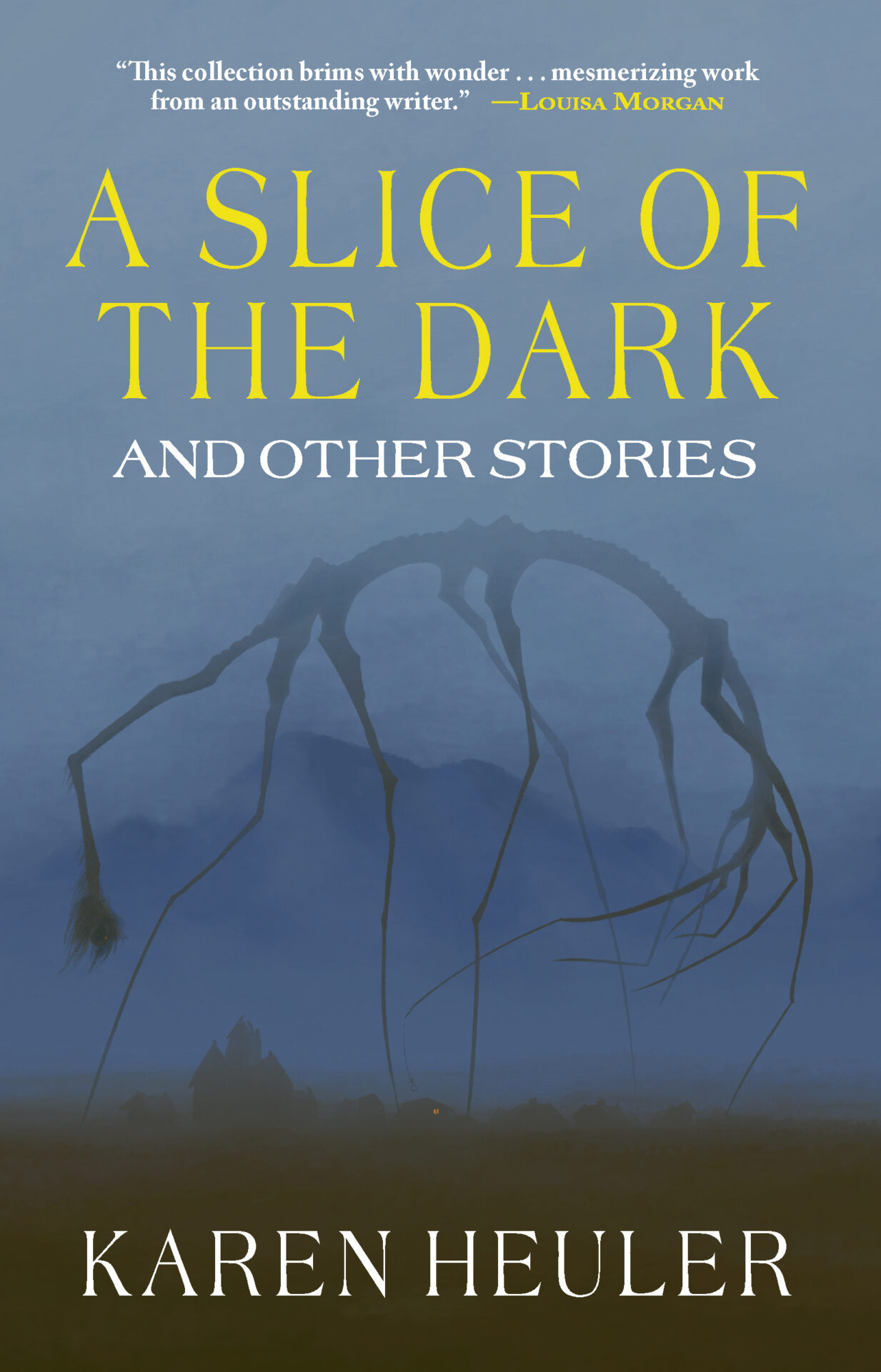
Karen Heuler is joining us today to talk about her novel, A Slice of the Dark. Here’s the publisher’s description:
If you got a mysterious box that said, Do Not Open, would you open it? If your fingers revolted and wanted a different job, would you agree? If you came from a race of giants, or thought about becoming Death’s lover, or couldn’t get rid of a lover no matter how hard you tried, what would you do?
What’s Karen’s favorite bit?

Karen Heuler
I’ve recently had my third spinal surgery, and while the pain has diminished, I still can’t walk well. In trying to figure out what was happening one doctor theorized that my spinal cord had been so compressed for so long that the nerves were having a sort of traffic problem in that their normal routes had been disrupted.
Proprioception might be the problem.
Propioception means the ability of the body to locate itself in the physical world. A lot of my stories involve characters for whom the normal physical world doesn’t fit right. To know when they’re balanced, where their feet are landing, what they’re touching, etc. So this suggestion made sense both physically and metaphorically. A lot of my characters find themselves uneasily in the center of a fight between reality and the sense of dislocation. Since my first spinal surgery involved weird sensations, loss of sensation, and paralysis, and that sort of thing continued through my life, it’s no surprise that the sense of traveling back and forth between the normal world and the strange world made up a lot of my thoughts and imagination.
Stories are preoccupations, myths, the drawing forth of meaning, the quest large and small, the understanding of the kinds of movement in one’s life. Many writers feel they are outsiders, not quite fitting into the social norms, not quite in line with the other kids in school, their coworkers, their families. Part of this may be the multiplicity of stories they carry in their heads and see as possible variations of the world. It’s hard to stick to one life when you’ve sampled many.
But part of it I think might also have to do with the sense that they too experience a kind of literary propioception. We all (I imagine) have a feeling of alienation because other lives appear to be seamless, to just work better than ours. We don’t see all the struggles, so our own struggles appear to be somewhat of a judgment. Or at least a mark.
My characters are often marked. Take “Teeth,” for instance in which a woman grows more and more teeth and then meets the devil, who invites a partnership. Or “The Fingers of Regina Durette,” where a composer’s fingers decide to go on strike until they can get a different position on her hands. They demand a change in life. Poor Regina.
Then there’s the title story, “A Slice of the Dark,” which could be a subtitle for most of my writing. Fragments of darkness begin to substitute for everyday objects, and a man becomes obsessed with it. Don’t we all? Don’t the odd things in life stand out and become numinous? Don’t we ascribe importance to random occurrences? Or are we instead attuned to the underthings in life, the way a worker in a sleep clinic in “Unquiet Dreams” becomes more attuned to the whispers in the hallways, the shadows in the corners.
I’ve often thought about what the stories we write actually reveal about us, though I’m probably not at all good at parsing that in others. I do worry sometimes that a story I’m writing reminds me of a story I’ve written before, but that actually makes sense. There are themes and obsessions in our writing, in every individual. What prompts our stories is different for each of us, and the influences may evolve over time, but we carry them like scars. Whether it’s a mood, a feeling, a frisson, an extrapolation—there’s something we go for, time after time. Our physical standing, our social standing, our political and moral and psychic constructs look over our shoulders and urge us on. I’ve known this for a long time, but it was Regina Durette’s fingers that really clued me in on it. They want to switch places because they’re not satisfied with how they’ve been treated. Arthritis has twisted my fingers a bit, so a few of them lean in the wrong direction. It was this story that really started me thinking about what draws me to the odd, weird, dissociative fiction—it’s the odd, weird, dissociative experience of the physical body that disturbs and fascinates. When the doctor suggested that my post-surgery difficulties were actually my spinal cord trying to find new directions, it made sense. I’ve been trying all my life to find the new pathways, the divergences from the normal neural network, and just as I am acutely aware of the changes in my ability to walk, I am aware of the changes in my confrontations with reality.
I have found a metaphor that works in both my life and my writing, and the pleasure I get from this new insight makes me even fonder of the quirky, bizarre, and determined characters encountered in the pages of this collection. Many of them have found new pathways, some puzzles, and some trials. Each step resonates for me, and I hope for you as well.
LINKS:
BIO: Karen Heuler’s stories have appeared in over 120 literary and speculative magazines and anthologies, from Asimov’s to Conjunctions to Fantasy & Science Fiction as well as a number of Best Of anthologies. Her newest story collection, A Slice of the Dark, was published in November from Fairwood Press. Shehas received an O. Henry award, been shortlisted for a Pushcart prize, for the Iowa short fiction award, the Bellwether award and the Shirley Jackson award for short fiction. Her stories and books often feature women facing strange circumstances on this world and others.
